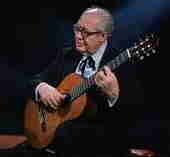 SKC Films Library SKC Films Library |
| SKC Films Library >> Musics >> Biography: Musicians |
| Andrés Segovia sought to have the guitar played on every major stage and to have music written specifically for it
Andrés Segovia was born in Linares, Spain, on February 18, 1894, and reared in Granada. He was tutored in piano and violin at an early age, but was not truly drawn to music until hearing the sound of a guitar. Disregarding the objections of his family and his teachers at the Granada Musical Institute, Andrés persisted in learning to play the guitar. Unable to find a competent teacher, he decided to teach himself. In Segovia's day the guitar was considered little more than a tavern instrument, suitable for accompanying songs and dances and little else. But Andrés believed otherwise. He set a goal for the guitar and himself -- to bring guitar studies to every university in the world; to have the guitar played throughout the world, on every major stage, just as the piano and violin were; and, to pass on his love of the guitar to generations to follow. He succeeded in all respects. Andrés made his public debut in 1909, in Granada, under the auspices of the Circulo Artistico, a cultural organization. The debut was more than successful, and before long he had gained an international reputation. By 1919 he was ready for a full-fledged world tour, beginning in South America. Subsequent engagements kept him away from Europe until 1923. Although Segovia enjoyed great success in the early years of his career he was still hampered by the lack of music written specifically for the guitar. Having to transcribe works for other instruments required a lot of his time, so he relied heavily on Renaissance and Baroque pieces composed for lute or Spanish vihuela. But then he discovered a body of works by Johann Sebastian Bach that proved well suited to the guitar. Segovia's transcriptions of these works, and subsequent playing of them, went a long way toward proving his assertion that the guitar had a valid place on the concert stage. In addition to proving the musical qualities and abilities of the guitar, Segovia also helped design what is now known as the classical guitar, which featured better wood and nylon strings. The shape of the guitar was also changed to improve the acoustics, allowing Segovia to play in large concert halls without amplification. He also worked hard to inspire composers to write music for the guitar, often under his direct tutelage. Guitarists and musicians who benefited either directly or indirectly from Segovia's teaching include John Williams, Eliot Fisk, Oscar Ghiglia, Charlie Byrd, Christopher Parkening, Michael Lorimer, Michael Chapdelaine, Virginia Luque, Alirio Diaz, and Lily Afshar. Andrés Segovia continued performing and teaching into his old age. He was enobled by the King of Spain on June 24, 1981. He died in Madrid on June 3, 1987. Segovia won the 1958 Grammy Award for Best Classical Performance -- Instrumentalist (Other than Concerto-Scale Accompaniment) for his recording Segovia Golden Jubilee.
SOURCE |
| SKC Films Library >> Musics >> Biography: Musicians This page was last updated on 06/06/2017. |
